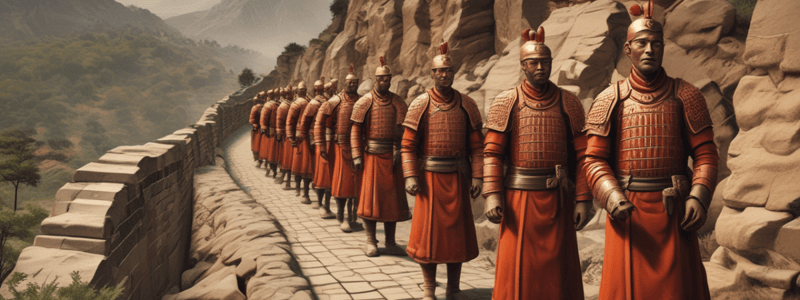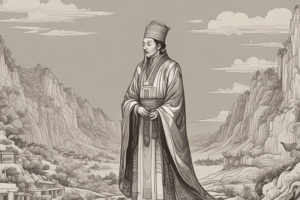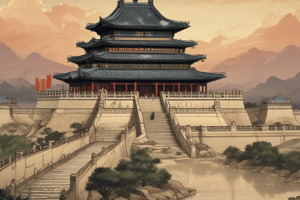Podcast
Questions and Answers
What was the punishment for individuals who hid forbidden books?
What was the punishment for individuals who hid forbidden books?
- Exile
- Imprisonment
- Fines
- Execution (correct)
What was Qin Shi Huangdi's obsession later in his life?
What was Qin Shi Huangdi's obsession later in his life?
- Achieving immortality (correct)
- Conquering neighboring territories
- Building a vast network of roads
- Building the Great Wall of China
What was the purpose of Qin Shi Huangdi's Terracotta Army?
What was the purpose of Qin Shi Huangdi's Terracotta Army?
- To demonstrate his military power
- To guard his grand tomb (correct)
- To defend against invading armies
- To symbolize his wealth and status
What was the substance Qin Shi Huangdi accidentally drank, which led to his death?
What was the substance Qin Shi Huangdi accidentally drank, which led to his death?
Who did Li Siu fear would replace him if he took power?
Who did Li Siu fear would replace him if he took power?
What was the outcome of Li Siu's manipulation of Qin Shi Huangdi's will?
What was the outcome of Li Siu's manipulation of Qin Shi Huangdi's will?
What was Hu Hai's reputation as a ruler?
What was Hu Hai's reputation as a ruler?
What was the origin of the saying 'don't kill the messenger'?
What was the origin of the saying 'don't kill the messenger'?
What was the outcome of the peasants' rebellion against the Qin Dynasty?
What was the outcome of the peasants' rebellion against the Qin Dynasty?
How long did Hu Hai rule the Qin Dynasty?
How long did Hu Hai rule the Qin Dynasty?
Flashcards are hidden until you start studying
Study Notes
The Qin Dynasty
- The Qin Dynasty was the first dynasty of Imperial China, lasting from 221 BCE to 207 BCE.
- It was preceded by the Warring States Period, which lasted from 481 BCE to 221 BCE.
- The dynasty was established by Ying Zheng, also known as Qin Shi Huangdi, who proclaimed himself the first emperor of China.
Ying Zheng and the Unification of China
- Ying Zheng defeated six other competing states during the Warring States Period to unify China.
- He defeated the Han in 230 BCE, the Zhao in 228 BCE, the Wei in 225 BCE, Chu in 223 BCE, Yan in 222 BCE, and finally the Qi in 221 BCE.
- After unifying China, Ying Zheng proclaimed himself Shi Huangdi and established the Qin Dynasty.
Policies of Qin Shi Huangdi
- He aimed to unify China and centralize the government.
- He ordered all states to surrender their weapons, which were melted down and made into statues and works of art.
- He introduced a new state coinage, simplified official ceremonies, and broke up feudal estates.
- He established a peasant registry and proprietorship for the soil.
- He built highways, standardized military equipment, and built irrigation systems.
- He regulated language, weights, measures, and the tax system.
Tyrannical Legacy of Qin Shi Huangdi
- He suppressed freedom of speech, burned books, and executed scholars with whom he disagreed.
- He was criticized for his egoism and delusions of grandeur.
- He took up grand architectural projects, including the initial construction of the Great Wall of China.
The Great Wall of China
- The Great Wall of China was built to defend the borders from northern invaders.
- Thousands of workers were forced to construct the wall, with poor labor conditions and little pay.
- The wall was initially built in 218 BCE, but the Qin Dynasty's wall is greatly eroded today.
Legalism in China
- Legalism is a philosophy that regards the state as more important than the citizen or individual.
- Qin Shi Huangdi implemented a form of legalism that dictated how people could speak, interact, and express themselves.
- This led to harsh and uncertain circumstances for the people living under his rule.
Fall of the Qin Dynasty
- The fall of the Qin Dynasty began around 213 BCE, with attempts made on Qin Shi Huangdi's life.
- His behavior became more erratic and paranoid, leading to stricter policies and increased security.
- He became obsessed with immortality and ordered the construction of his Terracotta Army.
- He died accidentally after drinking an elixir of mercury, and his prime minister Li Siu attempted to cover up his death.
- Li Siu changed Qin Shi Huangdi's will to name his younger son Hu Hai as heir, leading to a weak and cruel ruler.
- Hu Hai's rule eventually led to the downfall of the Qin Dynasty, with peasants rebelling and overthrowing the dynasty in 207 BCE.
Studying That Suits You
Use AI to generate personalized quizzes and flashcards to suit your learning preferences.




